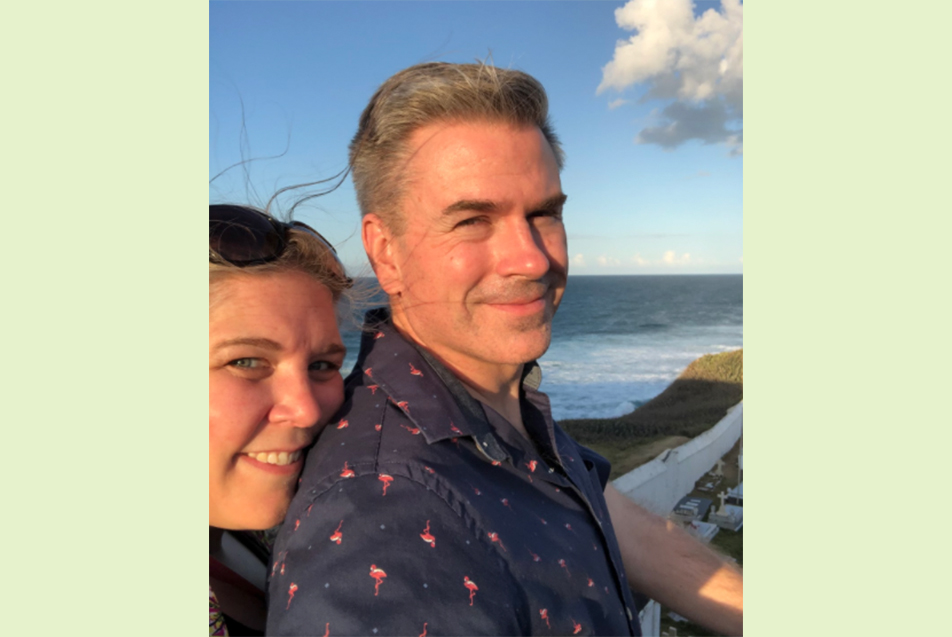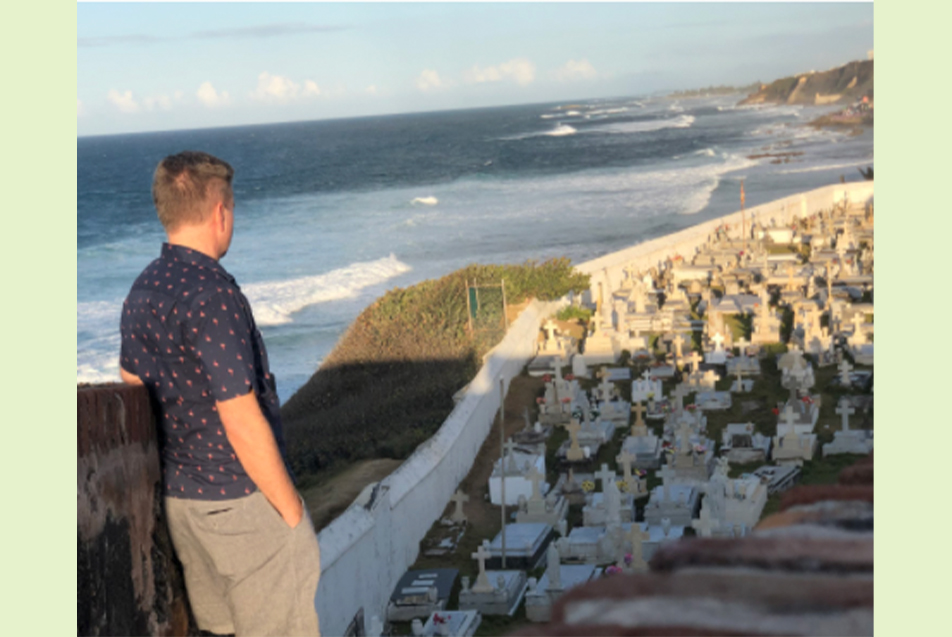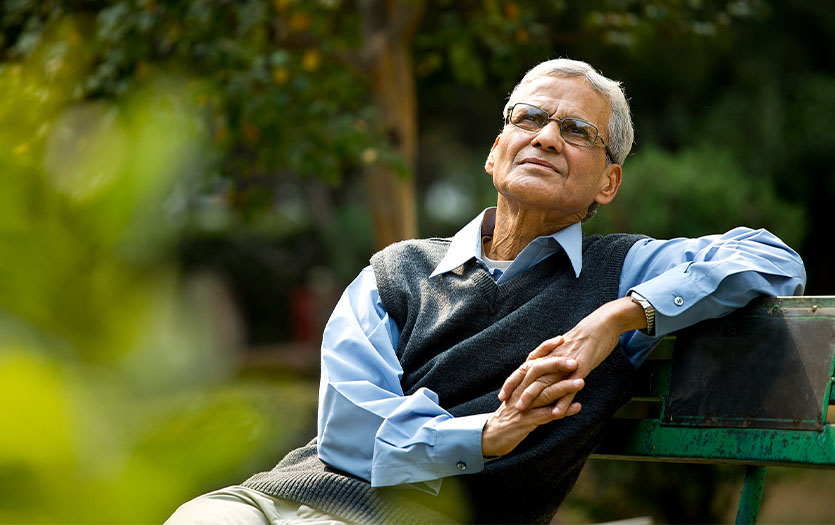
This post was written by Patrick Riecke, director, Dignity and Spiritual Care, Parkview Health.
I am a positive person. Really, I am.
I smile often. I am not depressed currently. The heavy-hooded cloak of depression rested briefly on my shoulders once. Its impression lingers, but I am cloak-free today.
And before you ask … yes, I am OK. Observe the horizontal laugh lines radiating from the outside edges of my eyes. Joy is my friend. I need you to know that before you read on. If you’re not convinced yet, can I play a video for you (pulling out my phone)? The video is my sons’ rugby match from last week. You can hear me losing my mind with joy as our club puts up 50 points on their rival. “Ohhhhh yeeeeesssss!” I shriek.
Maybe now you will believe that I’m not always morbid. If I can’t convince you, the following paragraphs may be too dark, heavy and honest for you to bear.
I am a positive person, really.
Fred Rogers (another positive, yet honest person), said, “Anything that’s human is mentionable, and anything that is mentionable can be more manageable. When we can talk about our feelings, they become less overwhelming, less upsetting, and less scary.”
So, let’s talk about the most taboo topic imaginable. Not politics. Not religion. Not current news.
Let’s talk about the topic that is so taboo that I swell with gratitude that Parkview allowed me to write about it.
Let’s talk about death.
Because, as one of our chaplains likes to say, “The mortality rate is still hovering right around 100%.”
Right now, everyone seems to want to draw lines of distinction with permanent markers. We fly flags telling the world which candidate we think is wrong. We affix bumper stickers that swiftly judge “those people.” We fight on social media and listen to news that fuels our separation and anger.
But I know one thing we can all agree on.
We. Will. All. Die. (At this point in the article, please remember that I am a positive person, really. I love rugby.)
I have a problem (that may be an understatement). One of my problems (and one of God’s biggest blessings in my life) is that I cannot forget that we all die.
Rereading my journals, I have always thought I would die young. I am afraid time is running out for me to die very young. Though I may still die fairly young. What is more, one of the departments I lead is our chaplaincy department. And chaplains sail the seven seas of death notices, traumas, disease, vent withdrawals, grief, miscarriage and stillbirth.
You see, as many as 80% of deaths nationally occur in healthcare facilities. Locally, that means if a mom miscarries, or a grandpa dies in hospice, or a young person succumbs to injuries after a car accident, a Parkview chaplain is likely involved.
You’ve walked this far in the dark with me. Now, let’s descend deeper into the cave.
My friend died, not even two months ago. She was a bright light by all accounts and one of my favorite people in the world. My wife, Kristen, and I had just returned from a vacation in Puerto Rico. Two hours later, at 1 a.m., I was in our ICU. My friend just delivered her first baby, a perfect infant. But then my friend’s heart stopped. After many hours of heroic care, she died. It was (is) the saddest I’ve been in a long time, not to mention the sadness of her young husband, her mother, brothers and sister, and many others, including Parkview coworkers.
Her story, prior to her sudden death, was one of those stories that gives hope in dark times. Her love story was born during a season of suffering. It proved that lights shine in the dark. Her story showed that hope can be born in the middle of sadness.
Since we are friends, can I open my broken heart to you a little more? I’ve been struggling with that last part. A person whose life demonstrated the goodness of God in our brokenness … is now dead. Sad is a desperately inadequate expression of how that feels.
I admitted these feelings to my friend and colleague Jon Swanson. He listened. He cried. Then he said, “Lazarus is dead.”
“What?” I asked. I know the story but wasn’t sure what he meant.
“For a long time, Jesus raising Lazurus from the dead was a good story, a hopeful story. But his story ended the same way every story ends. He died. Your friend’s story was a good story, a hopeful story. But her story ended the way every story must end.” Jon said, full of compassion.
Every story ends this way. I know it. I don’t like it, but I know it.
Every story ends this way. You know it. You don’t like it, but you know it.

I can hear sisters and brothers from diverse corners of Christianity shouting, “Wait, Rev. Riecke, there’s one story that doesn’t end in death. Jesus rose again!” Yes, he did, my Easter-oriented friend. But first … he died.
We avoid talking about death.
But historic spiritual leaders did not.
Jesus did not. He talked about his own death on nearly every page of the Christian testament.
A quote attributed to the Buddha says, "You too shall pass away. Knowing this, how can you quarrel?”
The Quran reminds its readers that “Every self will be tasting of death.” (Quran 21:35)
Judaism has lived with the knowledge of the death of all people since ancient times. Their holy book lists one generation after another, recalling deaths without hesitation in long genealogies.
The Hebrew Bible confronts us with our certain fate:
“Surely the fate of human beings is like that of the animals; the same fate awaits them both: As one dies, so dies the other.” (Ecclesiastes 3:19)
Lazarus is dead.
My son, Stephen, is dead.
My friend, whose perfect baby and precious husband I talk with daily, is dead.
Maybe someone in your life has died, too. What’s her name? His name? Say it out loud.
Each of these deaths confronts me with my own mortality.
After all, every story ends the same way.
However, there is a twist. Although we avoid the topic, prolong the inevitable, and cringe at funerals, death is giving us a gift, right now.
Knowing we will die is a gift. That knowledge can give each day purpose.
Make no mistake, death is not a gift. But knowing we will die can be a gift.
The fly in my bedroom yesterday was loud and clumsy. He bounced off windows, walls, and mirrors, not knowing that he was disturbing my nap time. He also didn’t know that he was about to die. Had he known, what would he have done? Would he have found Mrs. Fly and the rest of the Fly family and friends and said his heartfelt goodbye? Would he have made sure his affairs were in order? Would he have left mementos to those he left behind? Forgiven the moth that wronged him? Or even just spent a moment in quiet reflection?
Animals and insects die, just like us.
They never see it coming. Flamingo, fly or fox, they cannot reflect on the meaning of their limited lives. But we can. How can we not?
You will die.
That is certain.
I will die.
That is certain.
How then shall I live, knowing this information?
Life can give us a lot of time. Maybe a whole century in exceptional cases. But it’s never unlimited free refills like fountain drinks at a fast food chain. Eventually, we come to the bottom of the cup, at least in this life.
I’m a positive person, really. And my positivity often flows from making the most of each moment. After all, in my line of work, I cannot pretend that death isn’t coming for each of us. So, I will kiss my wife every day. I will hug my kids. I will scream at rugby matches. I will invest in my colleagues with abandon. I will write blogs that might be uncomfortable. I will speak my truth for fear it might be my last chance. I will say the words I think I am here to say.
Because, after all, Lazarus is dead.
But I’m smiling, my laugh lines creasing ever so slightly.
Resources for really living:
Parkview Center for Healthy Living
Henri Nouwen, Befriending Death
Patrick Riecke, How to Find Meaning in Your Life Before it Ends



